Science

Single genetic tweak in GMO corn boosts yields 10%—other crops could be improved, too
Supporters of genetic engineering have long promised it will help meet the world’s growing demand for food. But despite the ...

Study claiming neonic pesticides harm wild birds has no relevance to real-world conditions, plant geneticist argues
Capturing wild birds and force-feeding 3-10% of a lethal dose (of anything) is cruel. It’s not surprising birds would become ...

Fungus-treated tomatoes see 65% higher yields in salty soil, greenhouse study shows
Plant scientists in the Middle East have discovered that adding a desert root fungus, Piriformospora indica—first isolated in India—to the ...

‘Turning electrons into chemicals’: Scientists seek alternatives to oil-based manufacturing processes
Black, gooey, greasy oil is the starting material for more than just transportation fuel. It's also the source of dozens ...

Turkish scientist gets 15-month prison sentence after publishing study that links chemicals in food and water in western Turkey to cancer
A Turkish food engineer and human rights activist was sentenced .... to 15 months in jail after publishing the results ...

Using CRISPR to improve accuracy of cancer-fighting drugs
Cancer drug developers may be missing their molecular targets—and never knowing it. Many recent drugs take aim at specific cell ...

North American bird populations dropped 30% over 50 years, but causes hard to ‘pin down’
North America’s birds are disappearing from the skies at a rate that’s shocking even to ornithologists. Since the 1970s, the ...
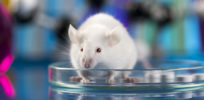
EPA plan to end animal testing by 2035 pits environmental groups against animal rights activists
The U.S. Environmental Protection Agency (EPA) in Washington, D.C., announced .... that it will stop conducting or funding studies on ...

Behavior goes ‘haywire’: How strep throat may trigger OCD, anxiety in children
[Pediatric autoimmune neuropsychiatric disorder associated with streptococcal infections, or PANDAS] is as puzzling for researchers as it is for the ...
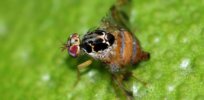
Chemical-free pest control tools on the way thanks to novel gene silencing strategy
In insects, rapidly evolving primary sex-determining signals are transduced by a conserved regulatory module controlling sexual differentiation. In the agricultural ...
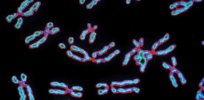
‘Huge step’ for synthetic biology: CRISPR upgrade allows editing of larger genome fragments ‘with ease’
Imagine a word processor that allowed you to change letters or words but balked when you tried to cut or ...

Why we may never know the fate—good or bad—of China’s controversial CRISPR babies
Since the gene-edited babies known as Lulu and Nana became international news in November 2018, scientific debate and media speculation ...

‘Brute-force approach’ to CRISPR innovation: China stakes out global leadership role developing medical treatments, transplantable organs, quality meat
China now has at least four groups of CRISPR researchers doing gene editing with large colonies of monkeys. “The most ...

China’s multi-billion-dollar investment in CRISPR could help feed its ‘massive’ population
[Cell biologist Gao Caixia] is one face of the Chinese government’s bet that CRISPR can transform the country’s food supply ...

Viewpoint: Stem cell therapies have potential, but commercial industry is ‘still shady, full of hype’
In case anyone was wondering, the commercial stem cell clinic business is still shady and full of hype, profiteering, and ...

Suspected Fusarium wilt infection in Colombia threatens global banana supply, but fungus-resistant GMO fruit on the horizon
In a long-feared development, an extremely damaging disease of bananas has apparently reached Latin America. Late last week, the Colombian ...
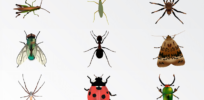
3 things we should do to preserve insect biodiversity
Insects make up the bulk of terrestrial diversity. Reports of insect declines, best documented in Europe and North America, suggest ...

Glyphosate-cancer lawsuits spur development of next-generation weed killers
"Total fear and shock." That's how Andrew Kniss, a weed scientist at the University of Wyoming in Laramie, describes the ...

Why genetic testing poses new legal perils for doctors
While DNA testing upends the practice of medicine, U.S. laws aren’t keeping pace. That’s one message from a nearly finished ...

Doctors face ‘wrenching questions’ about genetic testing and legal risks. Do we need new laws?
As DNA testing gallops ahead, doctors face wrenching questions about legal risks, protecting patients’ privacy, and the quality of the ...
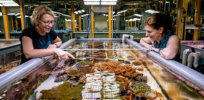
Can genetic engineering save the world’s coral reefs from climate change?
The relentless rise of global temperatures is imperiling coral reefs around the world. Just 75 kilometers offshore from the research ...

‘Sticky’ pesticides could protect crops, cut harmful agricultural runoff
A problem with many pesticides is that rain washes them off plants and into the soil and groundwater. Now, researchers ...

Drought and pollution: How do thirsty plants impact air quality?
[P]lants can both help create and cleanse one dangerous air pollutant: ground-level ozone, which causes breathing problems and exacerbates lung ...

Challenging the notion that people with ‘dark personalities’ are more successful
The dark side of human personality has long fascinated the public and psychologists alike. Research has linked unpleasant traits such ...

Did medieval Black Death reach as far as sub-Saharan Africa?
[S]ome researchers point to new evidence from archaeology, history, and genetics to argue that the Black Death likely did sow ...

Japan’s plan to deregulate CRISPR-edited crops may trigger backlash from consumers still wary of GMOs
Japan will allow gene-edited foodstuffs to be sold to consumers without safety evaluations as long as the techniques involved meet ...

There’s a war on ‘prediabetes’ and why that may be bad medicine
In medicine, prevention is usually an unalloyed good. But in this case, other diabetes specialists argue, medical and epidemiological data ...

Has genetic analysis identified Jack the Ripper?
Forensic scientists say they have finally fingered the identity of Jack the Ripper, the notorious serial killer who terrorized the ...

